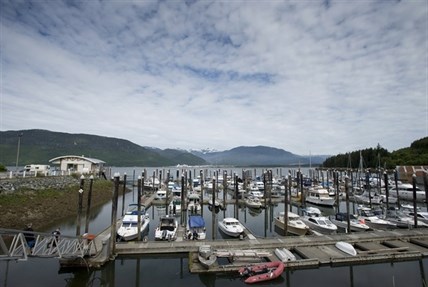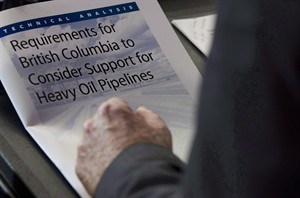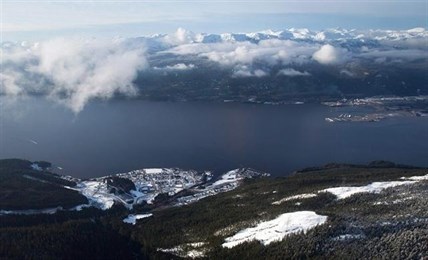
Boats sit in a harbour in Kitimat, B.C., Tuesday, June, 17, 2014. The federal government is expected to announce later Tuesday their decision on whether the Northern Gateway pipeline will be allowed to go ahead. The pipeline, once built, would bring oil from Alberta to Kitimat on the British Columbia coast to be loaded on tankers and shipped around the world.
Image Credit: THE CANADIAN PRESS/Jonathan Hayward
June 17, 2014 - 2:33 PM
VANCOUVER - The federal government is giving a conditional green light to Enbridge Inc.'s controversial $7-billion Northern Gateway pipeline project between the Alberta oilsands and the B.C. coast.
A joint federal review panel recommended approval of the 1,177-kilometre pipeline in December, with 209 conditions; the Conservative government has made it clear that finding new markets for Canadian oil is an economic priority.
The federal government's decision is contingent on Enbridge (TSX:ENB) satisfying all 209 of those conditions and embarking on more consultations with affected aboriginal communities.
"Today constitutes another step in the process," National Resources Minister Greg Rickford said in a news release.
"Moving forward, the proponent must demonstrate to the independent regulator, the NEB, how it will meet the 209 conditions."
Enbridge must also apply for regulatory permits and authorizations from federal and provincial governments, and Rickford noted that many of the 209 conditions listed by the National Energy Board call for additional consultations with First Nations.
"The proponent clearly has more work to do in order to fulfill the public commitment it has made to engage with Aboriginal groups and local communities along the route," said Rickford.
The project, which would move an estimated 525,000 barrels of petroleum products each day, still faces political and legal challenges from various fronts in B.C., where opposition to the project has grown as the decision drew near.
Those include a half dozen applications with the Federal Court for judicial review of the federal panel report recommending approval. The Gitxaala and Coastal First Nations have already said they are preparing broader lawsuits against either the federal government, the company, or both.
"There are going to very substantial delays on actually moving on this project," Werner Antweiler, who teaches at the University of British Columbia's business school, said in an interview Tuesday before Ottawa announced its decision.
"If there are more delays, what does it mean to the profitability of the project?"
There are three major competing proposals: Kinder Morgan's proposed expansion of its Trans Mountain pipeline to the Vancouver area, the Keystone XL line proposed to the U.S. Gulf Coast and Trans Canada's (TSX:TRP) Energy East into Quebec and New Brunswick.
"There's a very significant amount of money on the table for whoever gets the oil to market fastest," said Antweiler.
Kinder Morgan faces similar hostility toward the Trans Mountain line in B.C., and the Keystone XL pipeline to the U.S. Gulf Coast has stalled with U.S. lawmakers.
The B.C. government has set out five conditions for its approval of any oil pipeline project, including aboriginal consultation and a "fair share" of revenues for the province.
Premier Christy Clark has said the Northern Gateway has yet to meet those conditions — something she repeated at an event in Kitimat on Tuesday before the federal government decision.
"We settled the five conditions — they're very clear, they've been on the table for a very long time now," said Clark.
"It is up to the proponent in the private sector to figure how, if and when they're going to be able to meet them. None of them have yet."

The technical analysis and requirements for B.C. to consider support for heavy oil pipelines is seen as British Columbia Minister of Environment Terry Lake speaks about the Northern Gateway Project during a news conference in Vancouver, July, 23, 2012.
Image Credit: THE CANADIAN PRESS/Jonathan Hayward
SOME FACTS ABOUT THE PROPOSED NORTHERN GATEWAY PROJECT
VANCOUVER - Some facts about the Northern Gateway project:
Cost: Estimated to be $7 billion, but that figure has been increasing.
Route: Twin pipelines would run 1,177 kilometres from Bruderheim, just outside Edmonton, to a tanker port in Kitimat, on the northern coast of B.C.
Oil: A westbound pipeline would carry up to 525,000 barrels a day of synbit, a blend of refined synthetic oil and bitumen, two types of dilbit and synthetic oil to Kitimat for export.
Condensate: A second pipeline heading east would carry 193,000 barrels per day of natural gas condensate, which is used to dilute the molasses-like bitumen to allow it to flow through pipelines.
Terminal: The Kitimat Marine Terminal would include two ship berths and 19 tanks to store oil and condensate. It would have the capacity to serve about 220 tankers per year.
Value: The pipeline is estimated to be worth $300 billion in additional gross domestic product over 30 years. Governments are expected to net an estimated $80 billion in tax and royalty revenues over those three decades: $36 billion for Ottawa, $32 billion for Alberta and $6.7 billion for B.C. Saskatchewan would net an estimated $4 billion.
Jobs: The company says it would result in 3,000 new construction jobs in B.C. and 560 long-term jobs.
Consortium: Northern Gateway Pipelines is a limited partnership. Calgary-based Enbridge (TSX:ENB) has a 50 per cent stake. The rest belongs to 10 private investors.
Partners: Four of those investors remain confidential. National Energy Board documents reveal the other six are: French oil company Total; Suncor (TSX:SU); MEG Energy; Cenovus (TSX:CVE); Nexen (TSX:NXY), the Calgary company taken over last year by Chinese state-owned China National Offshore Oil Co.; and Sinopec, China's largest oil company.

The Haisla First Nation's Kitimaat Village is seen in an aerial view along the Douglas Channel near Kitimat, B.C., on January 10, 2012.
Image Credit: THE CANADIAN PRESS/Darryl Dyck
A TIMELINE OF MAJOR EVENTS IN THE NORTHERN GATEWAY APPLICATION PROCESS
VANCOUVER - Milestones in the Northern Gateway project:
March 6, 2002: Calgary-based Enbridge (TSX:ENB) announces preliminary plans for a pipeline linking the Alberta oilsands to the West Coast.
April 14, 2005: The company announces a deal with PetroChina Co. to transport oil from Alberta to the B.C. coast for export. The pipeline is expected to be in operation in 2010.
Nov. 1, 2006: With the National Energy Board process already underway, Enbridge announces it will delay Northern Gateway and focus on expanding pipelines to U.S. market.
March 23, 2010: Coastal First Nations declares a ban on oil supertankers in waters off the northern coast of B.C. It is the first aboriginal ban on the project.
May 27, 2010: Enbridge files its application to the National Energy Board to build the Northern Gateway pipeline and tanker terminal.
Sept. 9, 2010: The panel determines the company has submitted enough information for the project to proceed to public hearings.
Jan. 9, 2012: Then-natural resources minister Joe Oliver issues an open letter branding oil pipeline opponents "radicals" who are attempting to "hijack" the hearing process with funds from "foreign special interest groups."
Jan. 10, 2012: Joint review panel begins public hearings, spending 18 months travelling throughout B.C. and Alberta.
March and April 2012: Federal government announces changes to Navigable Waters Act and Canadian Environmental Assessment Act. Changes include giving cabinet final decision on projects rather than regulators.
July 11, 2012: The U.S. National Transportation Safety Board releases a damning report on a July 2010 spill of 3.3 million litres of diluted bitumen from an Enbridge pipeline into Kalamazoo River, likening the cleanup to Keystone Kops.
July 27, 2012: B.C. Premier Christy Clark announces her government will not support Northern Gateway or any other oil pipeline project unless it meets five conditions, including a "fair share" of revenues for the province.
March 18, 2013: Natural Resources Minister Joe Oliver announces first of several changes to marine safety rules for oil tankers. Several measures will also be announced for pipeline liability on land.
May 31, 2013: B.C. government lawyers tell the federal review panel that the province does not support the pipeline project as proposed.
June 24, 2013: Federal review hearings come to a close.
Nov. 5, 2013: The B.C. government backs down on revenue-sharing, saying a share of Alberta's revenues from heavy oil pipelines is no longer part of negotiations.
Dec. 5, 2013: Vancouver lawyer Doug Eyford issues a government-commissioned report saying Ottawa must build trust with First Nations.
Dec. 19, 2013: Federal joint review panel issues report recommending approval of Northern Gateway project, subject to 209 conditions.
Jan. 17, 2014: First of 10 applications filed in Federal Court and the Federal Appeal Court by environmental and First Nations groups seeking judicial review of panel recommendation to approve project.
April 13, 2014: Residents of Kitimat, site of the proposed marine terminal, vote against Northern Gateway in non-binding municipal plebiscite with a vote of 58.4 per cent opposed and 41.6 per cent in favour.
May 13, 2014: Transport Minister Lisa Raitt announces new rules for marine spill response.
May 14, 2014: Natural Resources Minister Greg Rickford announces more new rules for pipeline safety.
May 27, 2014: Rickford announces Ottawa will open a major projects management office in B.C. to work with First Nations on energy projects.
June 17, 2014: Federal government expected to announce its decision.
News from © The Canadian Press, 2014